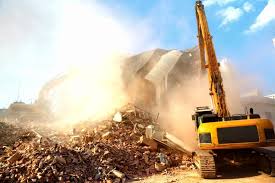Contractors perform several duties during renovation or building removal projects. They conduct site inspections, complete risk assessments, develop plans, and operate equipment. They can work on various tasks, ranging from landscape leveling and surgical demolition to whole-building destruction. Here are some of the roles and responsibilities of contractors during demolition projects:
Site Inspections
Before deconstruction begins, a contractor conducts a site inspection to determine any potential hazards or risks. They inspect the targeted structure to determine its state. They also look at the materials within the structure and the surrounding area. Contrators use these data points to determine the most appropriate demolition method, such as mechanical, implosion, or deconstruction.
Contractors also confirm that the demo project complies with local laws and regulations. They obtain proper permits and licensing before operating machinery or starting the project. This enables property owners to comply with local codes and safety expectations throughout the project’s timeline.
Work Method Selection
Depending on the size and scale of the project, as well as data gathered from the inspection, a contractor will select a demolition technique. Some common demo methods include:
- Mechanical: Mechanical equipment, such as bulldozers, excavators, or wrecking balls, is used to tear down walls and structures.
- Deconstruction: Contractors carefully dismantle specific structural areas to salvage materials that can be recycled and reused.
- Selective: Removing materials from non-load-bearing areas allows the structure to remain intact. Crews remove all recyclable materials.
- Implosion: Coordinated explosives bring down entire buildings in large, whole-structure demolition projects.
Work Site Management
During renovations and demo construction projects, contractors monitor potential hazards and implement safety measures for crew members. Enforcing safety policies keeps workers safe and prevents hazardous conditions from developing on the job site. Contractors oversee the containment and disposal of dangerous materials, such as asbestos and mold. They also oversee the organization of waste materials and recyclables to prevent contamination and clutter.
Demo project sites produce dust and other particles that become airborne. Contractors are responsible for implementing dust control measures to protect team members and surrounding communities from pollutants. Equipping workers with protective equipment like ventilators and safety glasses protects crew members’ health. Keeping the work site organized, removing debris promptly, and misting structures with water are effective strategies for reducing and managing dust during demolition.
Project Coordination
Contractors are helpful on demo sites because they coordinate with other vendors and specialists to make the project more efficient. They schedule material pickups and dumpster rentals, and they enlist the aid of professionals such as electricians or structural engineers. Contractors also work directly with clients to understand their preferences and determine project timelines. They remain in contact with clients throughout the project to provide updates about their demolition services and unexpected delays.
Start Your Demolition Project Today
If you need to demolish a wall, an entire structure, or a swimming pool, contact a demo contractor. These professionals will assess the work site for potential risks, identify hazardous materials, and determine which materials can be salvaged and recycled. Demolition companies may also offer landscape leveling to prepare your property for a new structure after removing an old one. Contact a demolition contractor today to receive a quote for your renovation project.


